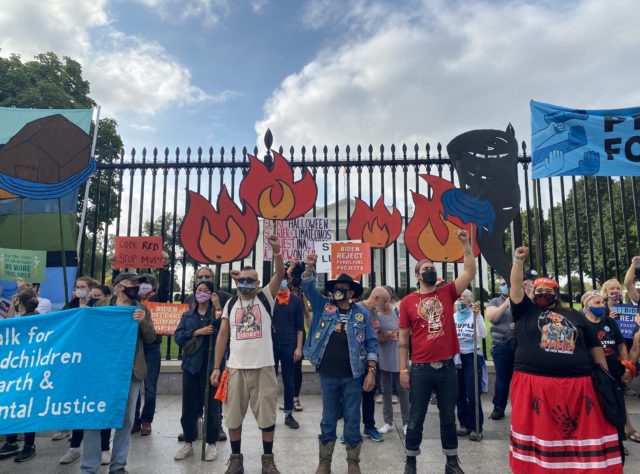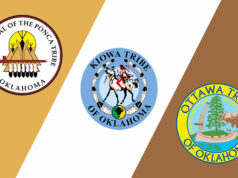
WASHINGTON — Indigenous activists from Oklahoma gathered in the nation’s capital this week for The People vs. Fossil Fuels, a weeklong rally to urge President Joe Biden to stop pending fossil fuel projects and declare a climate emergency.
Casey Camp-Horinek, councilwoman and hereditary drumkeeper of the Womens’ Scalp Dance Society of the Ponca Tribe of Oklahoma, and JoKay Dowell, who is an Indigenous Environmental Network organizer and a citizen of the Cherokee Nation, were among those who started protesting Monday, when the rallies officially began.
This story was reported by Gaylord News, a Washington reporting project of the Gaylord College of Journalism and Mass Communication at the University of Oklahoma.
“We have to stop selling out to the corporations and protect the people who are what this country is all about,” Dowell said.
Black Tiger, a cultural preservationist and Indigenous hip-hop artist who belongs to the Pawnee and Seminole nations, arrived in Washington last Friday to perform at an Indigenous Peoples Day event. He stayed to support the rally and said organizers asked him to perform.
“I wanted to be there to support, to stand in solidarity with people at the event in regards to protecting Mother Earth and protecting the water,” Tiger said.
The People vs. Fossil Fuels demonstration was organized by Build Back Fossil Free, a coalition of grassroots organizations that has brought together hundreds of Indigenous, Black and Latino environmental activists and allies from across the country to demand the government take action against climate change.
“We urge Biden to declare a climate emergency. In fact, it needs to be a global emergency declared by the United Nations,” said Camp-Horinek. “Oklahoma is the seed of the petroleum money that is fueling this climate crisis.”
Biden ‘promised he would listen to us’
In the past, Camp-Horinek has fought for Indigenous rights and against fracking, pipelines and plastics facilities in Oklahoma. According to the rally’s website, she is one of the primary mobilizers of the event.
On Tuesday, protesters gathered at the White House and, later, in front of the U.S. Army Corps of Engineers headquarters, where hundreds protested the recently completed Enbridge expanded Line 3 pipeline, which passes through Oklahoma.
At Tuesday’s rally, Tiger sang a song written in 2017 during an oil pipeline protest at Standing Rock, “Nawa mni wiconi tatacikstahu.” He said it is about two tribes, the Pawnee and Lakota, who are ancient enemies but are camping together in order to fight a common enemy.
The song, Tiger said, represents unity between the tribes’ languages, which allows the tribes to camp in peace.
If the Biden administration allows the 21 major fossil fuel infrastructure projects currently under federal review to move forward, the emissions equivalent of 316 new coal-fired power plants would be added, according to a new report from Oil Change International, a fossil fuels activism group.
“With the power of a pen, President Biden could stop these pipeline projects. He promised he would listen to us. He’s not listening. We’re coming every day of this week to tell Biden: Stop this madness,” said Joye Braun of the Indigenous Environmental Network.
Tiger said Indigenous people have suffered many lies and many broken treaties at the hands of the U.S. government, and that it seems like the Biden administration is “just talk, no action.”
“The power of the people in government is rooted in land theft, and so can they give that up? Because their addiction to it is so deep, fighting for that change seems like a long battle. It’s not going to happen overnight,” Tiger said. “If our people keep standing up for what’s right and for all the creations, the land and the water, I believe in time things will change.”
On Wednesday, Dowell said the government must take immediate action against the climate crisis because communities are losing their water sources, the weather has become more extreme, and there is a point of no return.
The rally concluded on Friday with a march to the Capitol.























